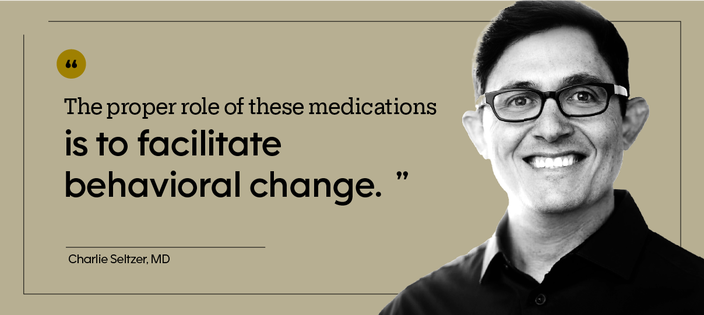What Is It Like When You Stop Taking Wegovy?
Key takeaways:
- Wegovy (semaglutide) is an injectable medication that is FDA approved for weight management.
- Some people who stop taking Wegovy describe increased appetite and weight gain.
- Wegovy is meant to be taken indefinitely to maintain weight loss. But a healthy diet and exercise habits can help you maintain weight loss if you stop taking it.
Wegovy (semaglutide) is an injectable medication that is FDA approved to help treat obesity.
Some people stop taking it because they don’t like the side effects, which can include nausea, diarrhea, vomiting, headaches, and stomach pain.
Others have difficulty obtaining Wegovy because of issues with their insurance or a shortage at their pharmacy. Some simply don’t want to take it forever.
Whatever the reason for stopping, one thing is clear: When you stop taking Wegovy, weight and appetite may come back. Here’s how three people describe what it was like when they stopped taking Wegovy.
Some weight came back
The issue of weight has been with Zuryna Livermore for as long as she can remember.
When she was in college, Zuryna weighed 340 lbs and had weight-loss surgery to help reclaim her health.
“I got the surgery, really relearned how to eat well, and lost about 120 lbs,” she says. “That felt great.”
Then Zuryna got married and got pregnant, and she gained 100 lbs. “After pregnancy, I really suffered from postpartum depression and really slumped back into those habits that led me to need weight-loss surgery,” she says.
She contacted the nutritionist she met through her surgery program and learned about a medication weight-loss program. That’s when Zuryna started taking Wegovy. Initially, she had some gastrointestinal side effects. But that went away, and she liked that Wegovy lessened her appetite.
![“I gained a total of 20 lbs when I was off [of Wegovy], but not too drastic.” — Zuryna Livermore](https://www.grxstatic.com/4f3rgqwzdznj/6a4dIjxqzi6zrNvHBXbz7m/202db22d64f55c5c05bfe486da8050a4/patient_stories_feel_wegovy_quote_1.png?format=png&auto=webp&width=704)
She took it for a year but had lapses of a couple of months when she couldn’t get her prescription filled because of a shortage of the medication.
etite, and she snacked more. Her weight started going up. “During the first 2 months, I gained back 10 lbs,” she says. “Then, in a 3-month span, I gained another 10 lbs. So I gained a total of 20 lbs when I was off [of Wegovy], but not too drastic.”
Zuryna, now 29, a project management consultant in Baltimore, started taking it again when it was in stock, but she doesn’t see herself taking it forever.
“I don’t foresee myself using [Wegovy] past another year,” she says. “I really do think that it kick-started my healthy relationship with food that I didn’t have prior to having my daughter. So I think that after a year, I’ll probably wean myself off of it.”
His appetite returned
Sam Tejada, a wellness entrepreneur and a former firefighter, is the founder of Liquivida, a chain of health and wellness centers. When his business started offering weight-loss treatment with semaglutide, Sam tried it.
When he started Wegovy, Sam says he had unpleasant side effects, such as nausea and an upset stomach. But he says the most concerning side effect was having dizzy spells. That made him switch to a different weight-loss medication to see how it affected him.
Once Sam reached his weight-loss goal, he stopped taking the injections. And when he stopped, Sam says, his appetite came back.
“I was a heck of a lot more hungry,” he says. “Not crazy hungry, but I was eating more and wanted to eat my three meals a day instead of the half a meal a day I had been eating.”

Sam says he was able to maintain the majority of his weight loss by being active and making healthy diet choices. But when his work travel picked up, he had trouble keeping up with his nutrition and exercise routines and started to regain some weight.
He restarted semaglutide and was able to reach his goal weight. As far as long-term use, Sam says he can see himself continuing to use weight-loss injections on and off as a tool in his health and wellness regimen. But his biggest focus, he says, is on maintaining a healthy lifestyle and making smart choices when it comes to nutrition.
Old habits came back
Charlie Seltzer, MD, a board-certified obesity medicine and internal medicine physician in Philadelphia, knows firsthand why people are intrigued about medications like Wegovy.
“They work better than anything I’ve ever seen for suppressing someone’s appetite,” which ultimately leads to eating less and losing weight, he says.
In addition to prescribing semaglutide to his patients, Charlie has taken it himself. Wegovy helped him lose 30 lbs.

Although he experienced side effects, such as nausea and gastrointestinal issues, Wegovy also helped restrict his appetite.
He reached his goal weight, but he also sometimes felt fatigued and weak. “I couldn’t even go to the gym anymore and was unable to work out,” he says. “I was even taking naps in between seeing patients.”
After stopping semaglutide, Charlie says his appetite came back within a week, and shortly after, he regained all the weight.
“I went right back to old habits,” he says.
Charlie says he wasn’t surprised by this result. “The proper role of these medications is to facilitate behavioral change,” he says. “The behaviors around food and diet are what need to change.”
After his experience using Wegovy and other weight-loss medications, Charlie says that when talking to his patients about them, he explains the risks and benefits of long-term use. He says that they are successful medications to jump-start weight loss. But if the habits don’t change, once you stop, the weight comes right back.
After stopping the medications, Charlie resumed working out and lifting weights, which helped him regain muscle.
He encourages anyone looking to try these medications for weight loss to talk in-depth with their healthcare team to find the best long-term solution to reach their goals.
What does the doctor say?
Patricia Pinto-Garcia, MD, MPH
Senior Medical Editor
Wegovy (semaglutide) is a new and powerful tool for weight management. But as these stories show, weight management is a lifelong process that requires many tools to help you maintain your comfortable weight. As you approach weight management, it’s important to use the right tool at the right time. For many people, Wegovy can be the right tool at the start of a new weight-management program.
Wegovy does suppress appetite. But it also increases your insulin levels, which can help improve blood sugar control if you have insulin resistance or diabetes. And it can lower your risk of having a heart attack or a stroke if you have heart disease. So Wegovy can help kick-start weight loss, but it can also help you manage other medical conditions. In turn, this can help you feel better overall so that you can more easily start using other tools, such as changing your diet and activity level.
Most people don’t want to take an injectable medication forever. And the effects of Wegovy wear off after you stop taking it. But it’s not all bad news. In an early clinical study, people who stopped taking semaglutide maintained some weight loss up to 2 years after stopping the medication. It’s possible that this was because people stuck with the changes they made while taking Wegovy. So if you try Wegovy, keep in mind that its effects won’t last forever, but it can make it easier for you to change and stick with strategies that can help you maintain a comfortable weight.

